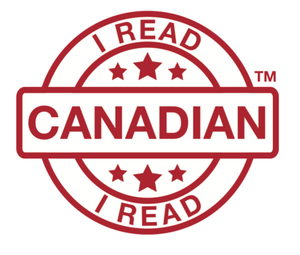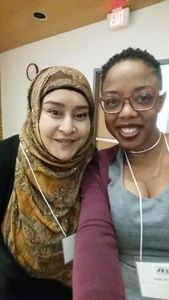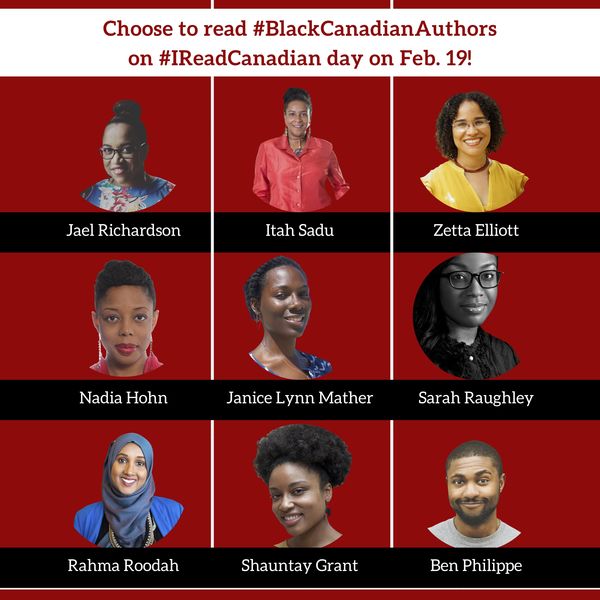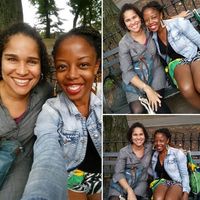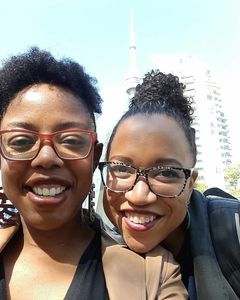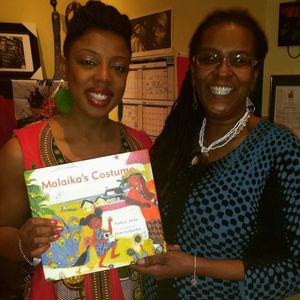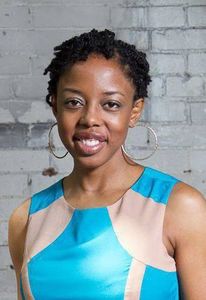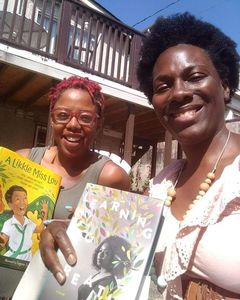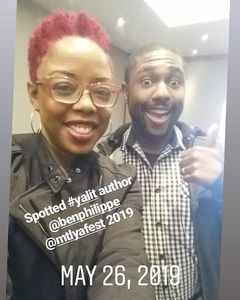Blogpost #5: I READ CANADIAN x BLACK HISTORY MONTH = #BlackCanadianAuthor Celebration
On February 19, 2020, thousands of schools and libraries across Canada will be reading books by Canadian authors. I Read Canadian Day started off as an idea by author Eric Walters in response to a decline in the sales of Canadian children’s literature in the last ten years.
“In December 2018, the More Canada report had just been published. It found that Canadian-authored books then represented just 15 per cent of book purchases — they used to represent 26 per cent. It also found that there were fewer publishers publishing Canadian books and that sales of Canadian books had declined by 44 per cent over the previous ten years — and that Canadians weren’t even sure if they were reading a Canadian book, partly because of online retailing.”
excerpt from Deborah Dundas of The Toronto Star, February 14, 2020
As a teacher, I can attest to the fact that my students are largely reading books published in the United States. As a reader growing up, I also read mostly African-American books because these were the books that reflected stories that were most like me. In response, Eric decided to meet with some of the gate-keepers within the Canadian children’s literature industry. The result: #IReadCanadian for the purpose:
“To raise awareness of Canadian books and celebrate the richness, diversity, and breadth of Canadian literature.”
The media has been very responsive including recent stories by the Toronto Star (linked in the first paragraph to Eric Walters), the Globe & Mail, and Quill & Quire. This campaign is supported by the Canadian Society for Authors, Illustrators, and Performers (CANSCAIP), the Canadian Children’s Book Centre (CCBC), and the Ontario Library Assocation (OLA). Authors across the country have taken to social media, videos, and special events. (I have volunteered to read books by Canadian authors at my local library.). Over 2, 000 schools across Canada have planned readings of Canadian texts for 15 minutes on Wednesday, February 19, 2020.
In November 2018, a conversation that I do not remember took pace at the National Council for Teachers of English (NCTE) Conference in Baltimore, MD. Author SK Ali reminded me that we talked about February being Black History Month and that she could create a graphic to commemorate both the month and #IReadCanadianDay. Fast forward to a telephone conversation in January and some texting and Ali’s creative technical prowess, I present the #IReadCanadian #BlackCanadianAuthors graphic.
Author S.K. Ali (left) and I at Packaging Your Imagination (PYI) Conference in Toronto, 2018
Your CanLit News
Subscribe to Open Book’s newsletter to get local book events, literary content, writing tips, and more in your inbox
The graphic that SK Ali designed (below)
I feel that it is important to highlight these authors because visibility builds legitimacy and awareness. Often people are surprised to know that there are Black Canadian authors especially those that write for young people. Despite the fact that Black adult fiction authors such as Andre Alexis, Lawrence Hill, Esi Edugyan, Dionne Brand, David Chariandy, George Elliott Clarke, Austin Clarke, and Ian Williams have won many of the major Canadian literary awards such as the Giller, Rogers’ Writers Trust Prize, and the Governor General Literary over the last several years, the recognition of writers for young people has been limited. Other than the Governal General 2018 win of Shauntay Grant’s Africville and nomination of Janice Lynn Mather’s Learning to Breathe, #BlackCanadianAuthors of children and young adult literature have been largely absent from award nominations . (You can read more about those authors in the profiles below.)
Upon Zetta Elliott’s recent visit to Toronto, she made an observation at a local bookstore.
“But what’s to be done for the reader who wants Black Canadian content? I worry that proximity to the US and access to African American authors will make it easy for Canadian publishers to shrug off demands for more Black Canadian kid lit authors.“
excerpted from Zetta Elliott’s blog 3 Feb 2020
How many Black Canadian Authors are there? The numbers are known. Based on my list (below), a high proportion are self-published. The Canadian publishing industry has not kept race-based statistics so there are no Canadian statistics about the racial identities of authors. From 2000-2012, Zetta Elliott has tracked books published in Canada by and/or about Black-Canadians. In Fall 2019, The Toronto Star published the results of its study on looking at diversity in Canadian children’s book publishing. The US has been tracking these numbers for at least 20 years through the Co-Operative of Children’s Books (CCBC) at the University of Wisconsin-Madison. The UK began tracking its own numbers as well. However a lot of work still needs to be done in Canada.
In support and recognition of the #BlackCanadianAuthors featured in this graphic, I thought it a good idea to share what it means to be a Black Canadian author books for young people. Please note that in addition to being authors, some of these individuals are “artivists”, educators, and have done great work within the literary community. As the inspiration for this blog post came just four days before posting this so I will be updating this post as more photos and responses are sent to me from the #BlackCanadianAuthors.
Zetta Elliott, PhD, Educator
www.zettaelliott.com
Hometown: Toronto, ON
Place of residence: Pennsylvania, USA
Books: 20+ self-published and traditionally-published titles including the recent Melena’s Jubilee: The Story of a Fresh Start illustrated (Tilbury House Publishers, 2016); Dragons in a Bag (2018) and The Dragon Thief (2019) (Random House Children’s Books); Say Her Name (Disney-Hyperion, 2020)
Upcoming title: A Place Inside of Me (FSG, July 2020)
What does it mean to be a Black-Canadian author?
I'm a Black Canadian author because I'm Black, Canadian, and an author. But I have never had a book published in Canada, which is one of the main reasons I live and work in the US. An author's life in Canada wasn't possible for me 25 years ago, and I still get rejection letters when my agent submits stories to Canadian presses today. So to be a Black author in Canada, to me, means being invisible.
______________________________________________
Jael Richardson, MFA, co-founder and artistic director of The Festival of Literary Diversity (FOLD)
www.jaelrichardson.com
Hometown: Brampton, ON, Canada
Books: Stone Thrower illustrated by Matt James (Groundwood Books, 2016); Stone Thrower: A Daughter’s Lessons, a Father’s Life (Dundurn, 2012)
Upcoming title: Gutter Child (HarperCollins Canada, 2021) in adult fiction
What does it mean to be a Black-Canadian author?
I don’t really know how to explain what it means to be a Black Canadian writer because even though it’s just a part of who I am, it’s all I know. I was born in Canada, and this is home. I guess it means that I have been given the honour and privilege of telling stories with a particular lens. And because I knew so few Black Canadian storytellers growing up, and because this problem of access still exists, it means that what I say and how I say things - what I write and who I write about - has a weight that I’m always aware of and thinking about and wrestling with.
__________________________________________
Itah Sadu, co-owner of A Different Booklist Bookstore and Cultural Centre
City of residence: Toronto, ON
Books: Greetings, Leroy illustrated by Alix Delinois (Groundwood Books, 2017); Christopher Changes His Name (1996) and Please Clean Up Your Room! (1993) illustrated by Roy Condy (Scholastic Canada); Name Calling illustrated by Rasheeda Haneef (Canadian Scholars’ Press, 1995); A Touch of the Zebras illustrated by Stephen Taylor (Three O’Clock Press, 2003); Mathieu Da Costa: First to Arrive (A Different Publisher, 2009)
___________________________________________
Nadia L. Hohn, BEd, MEd, Elementary School Teacher
www.nadialhohn.com
Hometown: Toronto, ON, Canada
Books: A Likkle Miss Lou: How Jamaican Poet Louise Bennett Coverley Found His Voice (Owlkids, 2020); Harriet Tubman Freedom Fighter (HarperCollins Children’s Books, 2018); Malaika’s Winter Carnival (2017) and Malaika’s Costume (2016) (Groundwood Books); Music and Media (Rubicon Publishing, 2015)
Upcoming title: Malaika’s Surprise illustrated by Irene Luxbacher (Groundwood Books, 2021)
What does it mean to be a Black-Canadian author?
Often it means advocating for diversity in children’s books, opening doors for other margnialized peoples, and making sure that I alone am not “the diversity” that the organization is seeking. It means remembering that I have a platform to share my culture, experience, and worldview in a space that many of my Black writing peers have not had. It means fulfilling a dream and being a voice for my people. It means passing down knowledge and creating a cultural legacy. It means creating visibility for Black Canadians when our existence is often erased. It means that I get to be a pioneer in a growing field of diverse literature for young people. It means a Black child can go into a bookstore and find a book that helps them to better understand themselves. It means that other children can read books that help them understand their friends, loved ones, and community members more. It means holding space for underrepresented voices at the table. It means also knowing when to engage and when to take a step back and let others to do the necessary work.
___________________________________________
Janice Lynn Mather, MFA, Yoga Instructor
www.janicelynnmather.com
Place of residence: Vancouver, British Columbia, Canada
Books: Learning to Breathe (Simon & Schuster, 2018)
Upcoming title: Facing the Sun (Simon & Schuster, 2020)
My next book is Facing the Sun. It’s the story of four girls—Nia, KeeKee, Faith and Eve—as their beachside community faces the threat of development and loss of access to the places they call home. At the same time, the girls are navigating personal struggles—a seriously ill parent, an overbearing mother, family secrets, and opportunities to betray one another in small or huge ways.
The story looks at if and how we find power when things seem out of our control, and whether, when big changes come to our lives, old relationships get left behind, or shifted and adapted to meet the new reality.
You can find Facing the Sun in stores August 4th, 2020.
What does it mean to be a Black-Canadian author?
For me, it’s a broadening of identity and an expansion of community. I grew up in the Bahamas, with a Jamaican mother who moved to England as a child, and a Bahamian father, and I moved to Canada right at the start of my 20s. With my family background, I grew up with a sense of connection to Caribbean and Black British cultures. Proximity to the US meant a degree of knowledge and exposure to that culture as well.
Making Canada my home and spending all of my adult life here has been a welcome opportunity to learn about—and be welcomed into—another aspect of the Black experience, to add my own stories to the Canadian conversation, to explore where similarities with other places lie, and to consider what is unique here. It’s really meaningful to be able to make a country your home partway through your life, and be welcomed as an author that belongs in that place.
____________________________________________
Sarah Raughley, PhD
www.sarahraughley.com
Hometown: southern Ontario, Canada
Books: Legacy of Light (Simon & Schuster, 2018); Siege of Shadows (Simon & Schuster, 2017); Fate of Flames (Simon & Schuster, 2016); Feather Bound (Watkins Media, 2014)
Upcoming title:
A trilogy, right now with the first book titled The Bones of Ruin. Alternate History Victorian London is the stage of a penultimate worldwide battle with an African tightrope walker as the centre of it all.
What does it mean to be a Black-Canadian author?
It means being a voice for kids like me who might of grown up thinking we didn't have one.
__________________________________
Rahma Rodaah*
www.rahmarodaah.com
Place of birth: Hargeisa, Somalia
City of residence: Edmonton, Alberta, Canada
Books: Muhiimah’s Quest illustrated by Daria Horb; Brother for Sale illustrated by Fuuji Takashi
Upcoming title: I am currently working on working on writing a humorous picture book that tackles the realities of having a sibling with food allergies. I wanted to bring awareness to this common issue and how a family can navigate this difficult reality with humour and gratitude.
What does it mean to be a Black-Canadian author?
I am proud to be a black Canadian author because Canada welcomed my family after we fled our homeland, and it's where I learned to read and fell in love with books. But have to say, I never saw myself reflected in any of those pages that captivated my attention. The Canada I saw on the streets full of different people, cultures, dialects, and faiths were simply not there in those books.
Now, to be in a position where I can write books for kids like myself and my children and a huge privilege. I am passionate about telling stories that connect and unite us all despite our differences in religion, culture, and skin color. The power of representation is something we should all be able to experience, and seeing the diversity of our country, slowly being painted in our bookshelf, is exciting.
________________________________________
Shauntay Grant, MFA, Assistant Professor of English at University of King’s College
Hometown: Halifax, NS, Canada
City of residence: Halifax, NS, Canada
Books: Africville (Groundwood Books, 2018), Up Home illustrated by Susan Tooke (Nimbus, 2008), The Walking Bathroom illustrated by Eric Bennett Banks (Nimbus, 2017), Apples and Butterflies illustrated by Tamara Thiebaux-Heikalo (Nimbus, 2012), The City Speaks in Drums illustrated by Susan Tooke (Nimbus, 2010), My Hair is Beautiful (Nimbus, 2019)
_____________________________________
Ben Philippe, MFA, Screenwriter, Assistant Professor at Barnard College
www.benphilippe.com
Hometown: Montreal, Quebec, Canada
City of residence: New York City, NY, USA
Book: The Field Guide to the North American Teenager (Harper Collins, 2019)
Upcoming title: My upcoming YA novel is Charming As A Verb (Balzer+Bray, 2020). Like 100% of my books so far, there's also an unexpected Canadian detour somewhere in there. It should be out this fall and I hope people will like it... I do!
After that, my first nonfiction book will be Sure I’ll Be Your Black Friend (Harper Perennial, 2021) which will be a collection of life essays that more or less aim to answer the first question.
What does it mean to be a Black-Canadian author?
Hm, it's hard for me to answer that because neither is a performed identity. It mostly just amounts to waking up every day. There's the Canadian and there's the black guy brushing his teeth in the mirror. I can't begin to imagine an alternative... I think maybe I feel "more Canadian," the more time I spend in the United States but that's for a very nice therapist to solve one day.
As for the author part, I know it comes with statistics and I try to be mindful of the barriers, struggles, and representational issues, without letting it drive my writing if that makes any sense. I don't think I would have as much fun with it if I wrote with that in mind.
_________________________________________
Please also look up work by these #BlackCanadianAuthors who have written books for young people. The authors with an asterisk (*) are self-published so you may need to go directly to their websites to order. The authors whose names have a 5 beside them were published in the last 5 years. I have also included illustrators marked with an i. Please note that some published authors listed are more known for their writing for adults.
- Belinda Ageda i
- Kayla and Kesia Alexander* 5 i
- Candace Amarante 5
- Ndija Anderson* 5
- Adwoa Badoe 5
- Lisa Bowen* 5
- Nadia Kenisha Bynoe* 5
- Eva Campbell 5
- Janet Campbell*
- Nadine Chevolleau*
- Fiona Raye Clarke
- Élisabeth Combres
- Afua Cooper
- K.S. Crooks*
- Christopher Paul Curtis 5
- Simone Da Costa* 5
- Baba Wagué Diakité
- Richardo Keens Douglas
- Bonnie Farmer 5
- Cheryl Foggo
- Claudia Hamilton* 5
- Sandra Hamilton* 5
- Natasha Henry 5
- Carol Ann Hoyte* 5
- Emmanuel J’ai
- Jenny Lynd James* 5
- Natalee Johnson* 5
- Bushra Junaid i
- K’Naan
- Sean Liburd* 5
- Yolanda T. Marshall* 5
- Jeff A.D. Martin* 5
- Sean Mauricette*
- Kelvin Nyeusi Mawaso*
- Dirk McLean 5
- Tollel Molelwe 5
- Kagiso Lesego Molope 5
- Sean L. Moore i 5
- Pamela Mordecai
- Dwayne Morgan* 5
- Naomi M. Moyer 5
- Blessing Musariri 5
- Angelot Ndongmo*
- Akilah Newton*
- Makelbaye Gali-Ngothe*
- Ekow Nimako 5 i
- Najla Nubyanluv* 5 i
- Louisa Onome 5
- Cynthia Reyes* 5
- Michelle Richards
- Stacey Marie Robinson* 5
- Rosemary Sadlier
- Olive Senior 5
- Adrienne Shadd 5
- Ras Stone i
- Wanda Taylor 5
- Michelle Thompson* 5
- Angela Walcott* 5
- Karee Shea Walker* 5 i
- Nadine Williams*
- Eleanor Wint*
Please buy, share, and support the work of these #BlackCanadianAuthors!
The views expressed in the Writer-in-Residence blogs are those held by the authors and do not necessarily reflect the views of Open Book.
